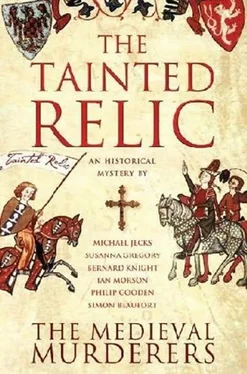‘We leave at dawn tomorrow,’ said Pichard, after the customary greetings were exchanged. ‘I have been away for three years now, and I doubt the Pope can manage without me much longer.’ He gave the two knights a genial wink, clearly looking forward to going home.
‘God speed,’ said Roger, reaching out to grasp the monk’s shoulder affectionately. ‘Ride light and fast, and do not drink any water your horse will not swallow. My mother told me that, and it is advice that has always served me well.’
‘Are you going to Rome too?’ asked Geoffrey of Julius, thinking uneasily that he would not make an ideal travelling companion for Pichard, especially if the monk had acceded to Peter’s request to take the cursed relic with him. Julius was secretive and unreliable.
Julius shrugged, and a crafty expression crossed his face. ‘Part of the way, perhaps. It depends on what opportunities arise as we go.’
Roger was disparaging. ‘Not many, I imagine. We looted the best of it on the way here, and I doubt there is much left for the return journey.’
‘I have no time for such diversions, anyway,’ said Pichard soberly. He lowered his voice confidentially, glancing around him as he spoke, to ensure he was not overheard. ‘I have been charged with taking a relic to the Holy Father in Rome. I do not want charge of such a thing longer than absolutely necessary, and intend to travel as fast as possible.’
‘A relic?’ asked Julius in a way that made Geoffrey uncomfortable. ‘I heard a lock of the Virgin’s hair is still unaccounted for, and we all chipped a bit off Abraham’s Rock in the Temple Mount.’ He tapped his scrip, to indicate he carried his piece with him.
‘Not all of us,’ said Geoffrey pointedly.
‘I have a piece of the True Cross,’ said Pichard softly. ‘One that is stained with the most precious blood of Our Lord Jesus Christ.’
Julius’s interest quickened visibly. ‘Does such a thing exist?’
‘It exists,’ said Roger, confidently knowledgeable. ‘My father is the Bishop of Durham, as you know, and he told me about the True Cross. For many years, no one knew what had happened to it, and it was assumed it rotted away on that hill over there.’ He indicated where he thought the site of the crucifixion might be with a vague wave of his hand. ‘But then it became known that the Virgin Mary had taken it home, chopped it into pieces, and given each of the disciples a lump.’
‘On her own?’ asked Julius sceptically. ‘These crosses were said to have been very large.’
‘Oh yes,’ said Roger carelessly. ‘She was a strong lady.’
‘I am not sure that is right,’ said Geoffrey, wondering whether the Bishop of Durham had really told Roger such a story, or whether he had heard something quite different and had embellished it to make it more interesting. ‘No one knows what happened to the cross, but the Emperor Constantine was said to have had a piece.’
‘My order has known for centuries that a part of it was here in Jerusalem,’ said Pichard. ‘Therefore, I was not surprised when I was asked to take a fragment to Rome.’
‘Where is it?’ asked Julius curiously.
‘Safe,’ replied Pichard. ‘In a place that only I know.’
Julius looked disappointed, and Geoffrey wondered whether he should advise Pichard against taking the man with him when he travelled. But Pichard was no fool, and Geoffrey supposed he knew what he was doing.
‘I am glad we met, Geoffrey,’ Pichard went on, ‘because I want you to do something for me. I am clumsy with a pen, but your writing is clear and neat. Will you act as scribe for me?’ Without waiting for an answer, he rummaged in his scrip for parchment, ink and quill, which he laid out on a low wall.
Geoffrey stepped forward obligingly, and took the proffered pen, dipping it in the ink and raising his eyebrows questioningly as he waited for Pichard to begin the dictation. It was not the first time he had been asked to write letters on the Crusade. A literate knight was unusual and, although most of his military comrades considered his education anathema, some nevertheless demanded his help on occasion. He bent over the parchment as Pichard started to speak in a low voice.
‘This is a fragment of the True Cross, stained with the blood of Our Lord Jesus Christ, which was preserved for safe-keeping in the Church of the Holy Sepulchre in Jerusalem…’
Roger leaned over to watch the words forming on the parchment. ‘Aye. A relic needs a bit of writing with it, so everyone will know it is real. Sign it with your name, too, to make it look official.’
‘And include the date,’ added Julius helpfully. ‘That will tell everyone it was found after the rescue of the Holy City from the infidel. No one will question its authenticity then.’
‘And a seal,’ suggested Roger. ‘It needs a proper seal.’
‘I do not have one,’ said Geoffrey, whose hands were devoid of the heavy rings many men used to imprint the letters they had composed. He finished writing the Latin words in his neat round-hand, and waited for the hot evening sun to dry the ink.
‘Use mine, then,’ offered Roger, pulling the massive ring from his middle finger. ‘My father gave it to me after he bought himself a larger one.’
Roger could not write, and had never needed to append a seal to any kind of document, but the ring was gold so he was fond of it. It comprised a disc similar in circumference to a silver penny, and was decorated with a cross surmounted by a mitre, to represent the Bishop of Durham’s office as prelate. Geoffrey took it and jabbed it in the middle of the heavy wax that Julius was dripping on to the bottom of his parchment.
‘There,’ said Julius in satisfaction. ‘Now it carries the seal of a powerful Norman bishop. No one will ever dare question its authenticity.’
Geoffrey was not so sure, given the dubious reputation of many bishops-and Roger’s father in particular-but he held his tongue, and concentrated on waving the parchment until the wax had set. He handed the completed document to Pichard, who took it and secured it in his scrip. The compline bell jangled again, and Pichard began to move towards the Church of the Holy Sepulchre. The others followed.
‘Did you hear what happened here?’ asked Roger, gazing up at the church’s odd mixture of towers and domes as he walked. ‘Miles of Clermont, who was in charge of subduing this particular area, came across an Arab who claimed he was a faithful servant of our Church-and who demanded that he and his family should be spared because of it. But Miles taught him what happens to infidels who soil our sacred things with profane hands. What did the priests imagine they were doing, allowing an Arab inside such a place?’
‘Tradition,’ said Pichard softly. ‘Barzak’s family had looked after the relic for years. He was a loyal servant of the Church, and Miles should not have killed him.’
He nodded a farewell to Geoffrey and Roger, and entered the building. Julius scurried after him, and Geoffrey watched them with a troubled expression. He wished Pichard had not told Julius about the relic, and wished even more that Julius was not travelling with the monk the following morning. He also wondered whether he had been right to tell Peter that Pichard was someone who could be trusted, fearing that Pichard’s willingness to take the relic to Rome might bring him a great deal of trouble.
He watched the two monks aim for the chancel, then followed, intending to cut through the building to reach his temporary lodgings in a lane on the other side. The evening office was already under way, and the heady scent of incense wafted along the nave. The priests clustered around the high altar, chanting a psalm, and their voices echoed through the various chapels that comprised the complex little church. It was cool inside, after the heat of the day, and Geoffrey wanted to linger, to savour the peace, but Roger had other ideas, and began regaling his friend with descriptions of a new brothel he wanted them to visit that evening. He tugged on Geoffrey’s sleeve when the knight paused, urging him to hurry.
Читать дальше












